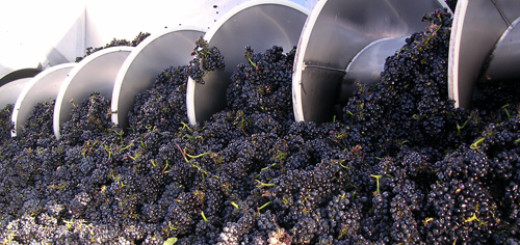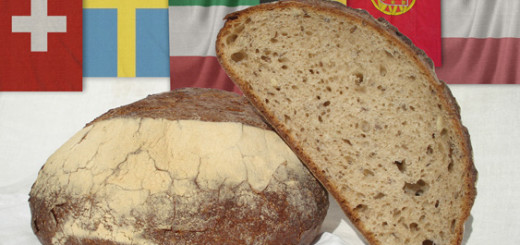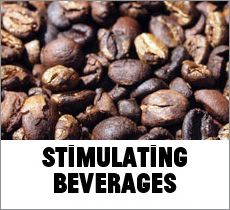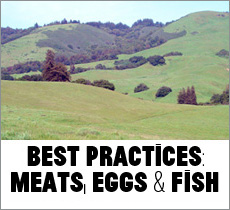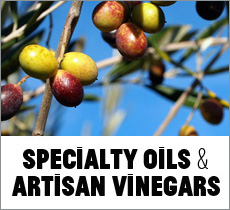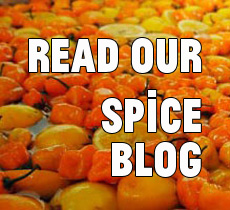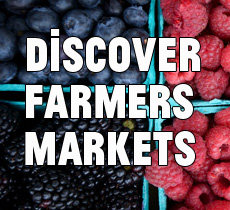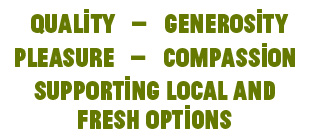Food Justice to the Plate
Over a recent meal featuring fruits and vegetables, one of my relatives on the reddish side of the political spectrum made a comment about how much he disliked people living in the country illegally. My much beloved relative—who has health issues and strives to eat well—also suffers from a serious blind spot with regard to whose hands picked the fresh produce his doctor-prescribed healthy diet demands. Who does he think harvests the produce that features in so many dishes he enjoys and eats for health? Fruit and vegetables don’t pick themselves.
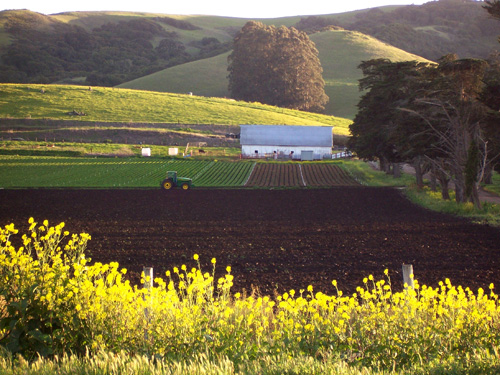
Sustainable Foodies Converge to Share and Strategize
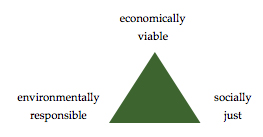 We’ve just returned from Santa Barbara where we attended an empowering conference with fellow sustainable food advocates presented by the fine folks with Edible Communities Publications, Edible Institute 2012. Solutions-oriented writers, ranchers, organizers, film directors, fishermen and other advocates for promoting a sustainable food system gathered for two beautiful days to discuss, challenge, and strategize how to best spread the word about shifting from an unsustainable industrial food system model to a more sustainable one.
We’ve just returned from Santa Barbara where we attended an empowering conference with fellow sustainable food advocates presented by the fine folks with Edible Communities Publications, Edible Institute 2012. Solutions-oriented writers, ranchers, organizers, film directors, fishermen and other advocates for promoting a sustainable food system gathered for two beautiful days to discuss, challenge, and strategize how to best spread the word about shifting from an unsustainable industrial food system model to a more sustainable one.
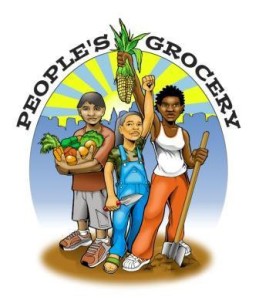 The most consistent message I heard throughout these presentations focused on social justice, a lesser-discussed component of sustainability. People’s Grocery executive director Nikki Henderson set the tone with her opening keynote speech where she gently but firmly encouraged eaters everywhere to remember that “food should be a just concern.” Every day, the democratic mission of the People’s Grocery is to help secure healthy food for everyone. She applauded the efforts of sustainable food enthusiasts in advocating for better conditions for farmers and meat animals but wondered why the quality of life for eaters, especially those experiencing serious food insecurity, seemed a less pressing issue in the current sustainable food movement.
The most consistent message I heard throughout these presentations focused on social justice, a lesser-discussed component of sustainability. People’s Grocery executive director Nikki Henderson set the tone with her opening keynote speech where she gently but firmly encouraged eaters everywhere to remember that “food should be a just concern.” Every day, the democratic mission of the People’s Grocery is to help secure healthy food for everyone. She applauded the efforts of sustainable food enthusiasts in advocating for better conditions for farmers and meat animals but wondered why the quality of life for eaters, especially those experiencing serious food insecurity, seemed a less pressing issue in the current sustainable food movement.
Improving the plight of the human component of the current American food system—particularly farmers, laborers, and eaters—preoccupied every presentation, discussion, and lunch table throughout the conference. A blueprint for how to orchestrate change is happening organically but challenging forces are widely arrayed and very powerful. This conference provided a forum for furthering work on that blueprint and for inspiring action through every media.
 Tracie McMillan urged us to never forget the human factor as we work to change the emphasis of the US food system away from producing cheap food by exploiting the powerless. In her book The American Way of Eating, she worked undercover in Barbara Ehrenreich’s Nickel and Dimed-fashion to discover the experience of laborers in the US food system, including as a field worker. She encouraged the audience to help spread the message that we should “talk about food as if the people who make it really mattered.” Intellectually and morally, is our diet really healthy if we eat food harvested by exploited farm workers and, in between bites, advocate for sending these same people back to their home countries because we’re afraid they’re taking American jobs?
Tracie McMillan urged us to never forget the human factor as we work to change the emphasis of the US food system away from producing cheap food by exploiting the powerless. In her book The American Way of Eating, she worked undercover in Barbara Ehrenreich’s Nickel and Dimed-fashion to discover the experience of laborers in the US food system, including as a field worker. She encouraged the audience to help spread the message that we should “talk about food as if the people who make it really mattered.” Intellectually and morally, is our diet really healthy if we eat food harvested by exploited farm workers and, in between bites, advocate for sending these same people back to their home countries because we’re afraid they’re taking American jobs?
From Xenophobia to Rotting Produce
In the Central Coast throughout the year, we see workers energetically working the field rows. These hard working people run while carrying filled boxes of produce to the collection truck. When was the last time you ran all day on your physically-exhausting job knowing that your take home pay will be barely enough for you and your family to get by? And, that the customers who eat the food you harvest will hate you? We drive through the Salinas Valley regularly on our way to Monterey and see hardworking people every day picking the lettuce that ultimately becomes the salad that will feed my anti-immigrant relative. Where’s the logic?
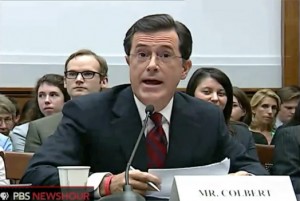
Stephen Colbert testifying before the House Judiciary Committee, September 2010
To trumpet this illogic, we need more fearless voices like Comedy Central’s Stephen Colbert’s who testified in character at a September 2010 House Judiciary Hearing on the state of agricultural jobs in the U.S. and discussed, with his special brand of humor and truth telling, his experience trying for one day the “Take Our Jobs” United Farm Workers challenge. “Don’t make me go back,” to that hard work, he pleads. “Even the Invisible Hand doesn’t want to pick beans!” In his five minute testimony, he was in as fine a form as when he was invited to present to the 2006 White House Correspondent’s dinner and roasted President George W. Bush.
Stephen Colbert in character at congressional hearing
In the past year, headline after headline has captured the disconnect between anti-immigrant attitudes and food rotting in US farm fields because farmers can’t hire enough workers:
- The High Cost of Anti-Immigrant Laws
- Tomatoes Rotting in Fields as Result of Immigration Law
- Despite High Unemployment, Farms Can’t Find Workers to Pick Strawberries
- Hiring Locally for Farm Work Is No Cure-All
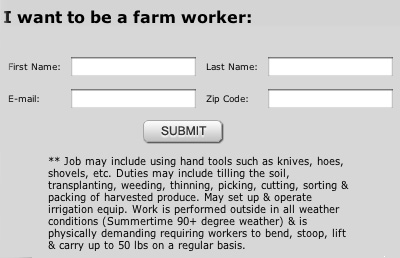
signup form for “Take Our Jobs”
Robin Romano, producer and director of The Harvest/La Cosecha, also presented at the Edible Institute conference and graciously lent me a few minutes of his time for a quick interview. When I mentioned how perhaps people holding anti-immigrant attitudes should simply not eat fruits and vegetables, he said that the issue is much broader than this particular hypocrisy. He believes that anti-immigrant fervor is being stoked in the US as a distraction from the real issues compromising our food system and our country:

Zulema, age 12: American citizen & field worker
“We have a very, very distorted food system and we’ve allowed politicians to play a game with smoke and mirrors rather than dealing with the real issues that we’re facing. We’re facing real issues with the three E’s—energy, the economy and the environment—and nobody really wants to deal with that. They’re all kicking the can down the road.

Victor, age 16: American citizen & field worker
“So what are they going to do? They’re going to bring out a little puppet show about illegal immigrants and they’re going to tell you that’s the reason why you don’t have a job. They’re not going to say that it’s because of de-regulation, modifications to the global supply chain, the acceleration of information exchange and everything else: they’re not going to explain to you the real reason why we’re facing these challenges. They’re just going to pick on something that’s easy to pick on [immigrants] and distract you from the real heavy lifting that needs to go on.”
The powerful use these xenophobic appeals to distract susceptible Americans from recognizing the root cause of the ills compromising our nation’s economic health. The reason people don’t have jobs has nothing to do with the people who perform the lowliest but most important job in our food system: harvesting the food we eat every day. A handmade sign posted along Highway 101 in an agricultural community between Salinas and King City proclaims in red, white and blue letters and children’s handprints, “We love the USA!” At the same time, a collection of powerful people drink Champagne on a balcony above Zuccotti Park to mock protesters who dare question their position of power. Farm workers feed you while the powerful drain you through a thousand fees. Who deserves more respect? Who contributes more to society?
Spread the Word
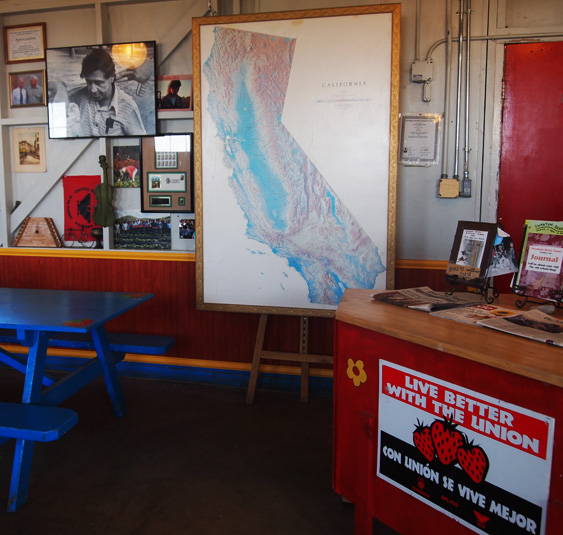
farm worker resource room at Swanton Berry Farm, which only employs union labor in their berry fields
A growing number of blogs and websites strive to challenge this paradigm and raise our awareness of the serious repercussions of continuing with the industrial food system. Of course, in the wide world of the Internet, these voices must compete with a growing amount of chatter across the web. Help counter the noise and spread the word about these sites. Share your links and ideas below about other resources that can help address these challenges in the kitchen and the fields, on the street, in the boardroom, at the store, and everywhere we make decisions about food and the people who produce it. Thankfully for my beloved relative, migrant farmworkers put food on the plate of every American eater, regardless the color of their political persuasions.
More Info
Agriculture & Land-Based Training Association
Tomatoland: How Modern Industrial Agriculture Destroyed Our Most Alluring Fruit by Barry Estabrook
Giving Grapes: Mano Tinta on Central Coast Foodie
portrait photos: Robin Romano

